Asia Policy Assembly 2019
The Asia Policy Assembly was held June 18–19 in Washington, D.C. The Assembly is a core element of the NARP and engaged policymakers, practitioners, and scholars to enhance understanding of critical developments in Asia. The Assembly also highlighted the policy research of the NARP Fellows, who presented preliminary research findings.
Read a welcome letter from Senator Patty Murray (D-WA).
WELCOME REMARKS
The president of the National Bureau of Asian Research, Richard J. Ellings (at left below), and the president of the National Defense University, Vice Admiral Frederick Roegge (at right below), delivered welcome remarks. Read a welcome letter from Ellings and Roegge.
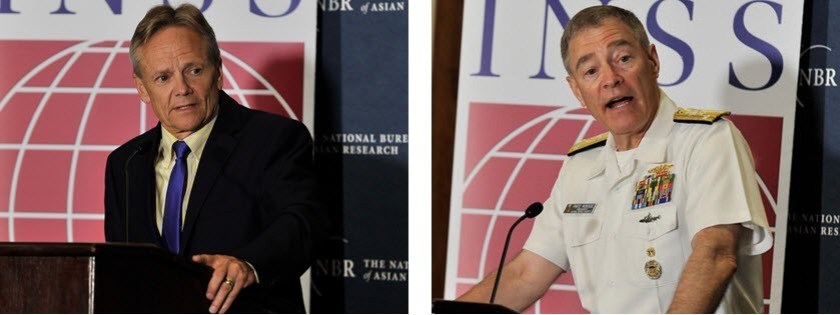
KEYNOTE ADDRESSES
Keynote Address by Senator Cory Gardner
In his keynote address, Senator Cory Gardner (R-CO) underscored the importance of formulating an American policy toward the Indo-Pacific based on values of freedom and democracy.
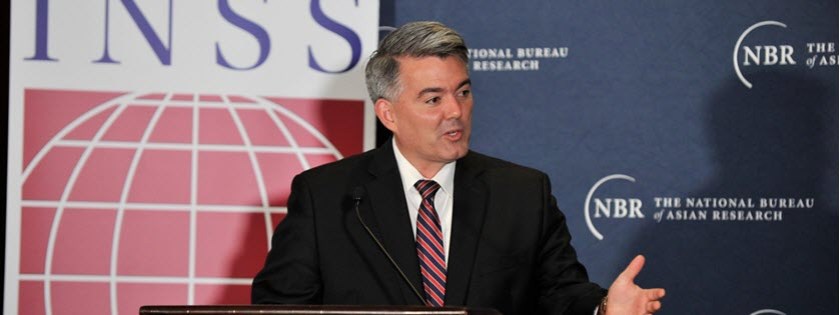
Keynote Address by Assistant Secretary Randall Schriver
Assistant Secretary of Defense for Indo-Pacific Affairs Randall Schriver discussed how the Department of Defense seeks to address the China challenge through military preparedness force development, engagement with allies and partners, and the promotion of a networked region.

Keynote Address by Former Senator Slade Gorton
NBR Counselor and former Senator Slade Gorton called China one of the greatest challenges of our lifetime and urged U.S. policymakers to develop thoughtful and forceful policy ideas that can help the United States address this challenge.
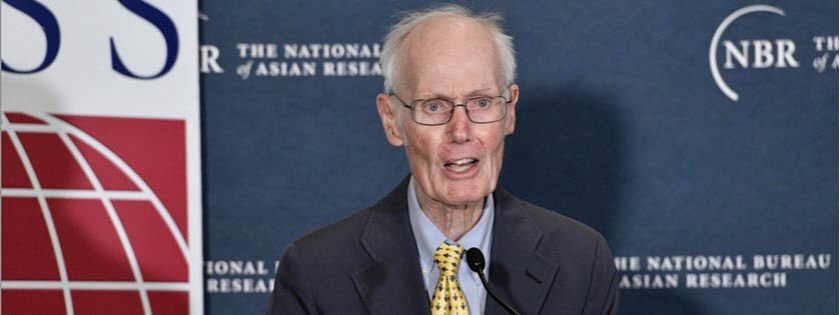
PLENARY SESSIONS
U.S.-China Strategic Competition
Richard J. Ellings (NBR) and Aaron L. Friedberg (Princeton University) assessed the state of U.S.-China strategic rivalry and underscored the need to develop a more effective approach to China and the Indo-Pacific region. Laura Junor (NDU) moderated the discussion.
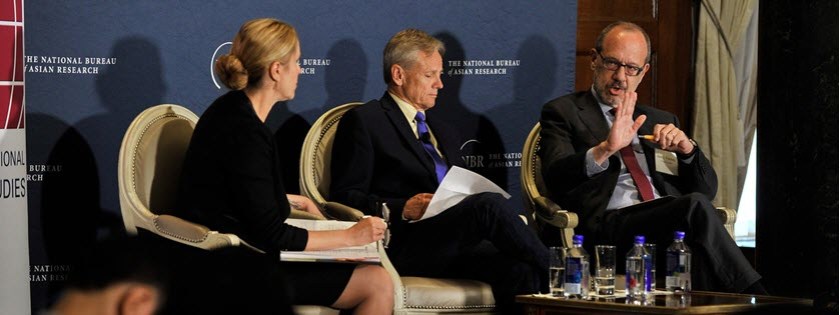
Trends in Trade, Investment, and Finance
Michael Beckley (Tufts University), T.X. Hammes (NDU), and Claire Reade (Arnold & Porter) discussed the overall economic trends in the Indo-Pacific and the potential impact of the ongoing trade war, the slowdown of the Chinese economy, and the fourth industrial revolution. Amy Celico (Albright Stonebridge Group) moderated the discussion.

China’s Responses to a Changing Security Environment
Phillip C. Saunders (NDU) and Thomas G. Mahnken (Center for Strategic and Budgetary Assessments) examined the global ambitions of the People’s Liberation Army and the strategic calculation behind its disruptive activities in the region. Abraham M. Denmark (Wilson Center) moderated the discussion.

America’s Alliances and Partnerships in the Midst of Strategic Competition
Kazutoshi Aikawa (Embassy of Japan) and James F. Moriarty (American Institute in Taiwan) discussed how Taiwan and Japan are contributing to the United States’ Indo-Pacific strategy. Roy Kamphausen (NBR) moderated the discussion.
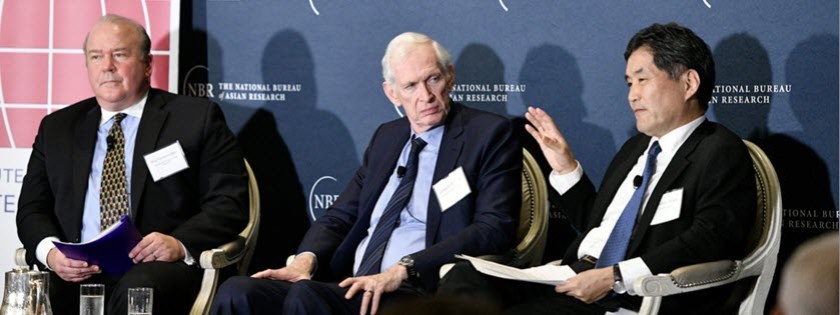
Democracy in Asia
Carolyn Bartholomew (U.S.-China Economic and Security Review Commission), Tariq Karim (former High Commissioner of Bangladesh to India), and Daniel Twining (International Republican Institute) discussed the state of democracies across the Indo-Pacific and the role of the United States in supporting democracy in the region. Michael Wills (NBR) moderated the discussion.
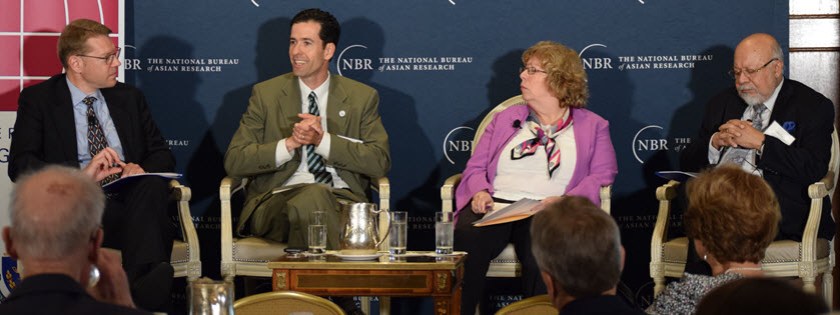
ROUNDTABLE DISCUSSIONS
NARP Fellows presented their preliminary research findings at the roundtables listed below.
China Goes Abroad
The roundtable evaluated multiple dimensions of China’s efforts to integrate the Eurasian continent through the Belt and Road Initiative and thereby expand its global influence.
Moderated by:
Nadège Rolland, The National Bureau of Asian Research
China’s Belt and Road: One Initiative, Three Strategies
Joel Wuthnow, National Defense University
China’s Strategic Strongpoints: Overseas Ports and Maritime Power
Isaac B. Kardon, U.S. Naval War College
Building the 21st Century Maritime Silk Road: Ports, Industrial Clusters, and the Export of the China Model of Development
April A. Herlevi, CNA
Competition on the Periphery
The roundtable examined U.S. partnerships with India and the Philippines in the midst of intensifying competition between the United States and China.
Moderated by:
Thomas F. Lynch III, National Defense University
Whither a Networked Security Architecture? Overlapping U.S.-Indian Interests and Alignments, and Implications for the Indo-Pacific
Sameer Lalwani, Stimson Center
Understanding Past Failures to Launch in the U.S.-India Defense Relationship
Christopher Clary, University at Albany, State University of New York
Shoulder-to-Shoulder: Defense Diplomacy’s role in Sustaining the U.S.-Philippine Alliance
Gregory H. Winger, University of Cincinnati
Energy Security
The roundtable explored the current state of nuclear and natural gas industries in the Indo-Pacific and China’s expanding role in providing energy infrastructure.
Moderated by:
Clara Gillispie, The National Bureau of Asian Research
Exporting Nuclear Norms: Japan and South Korea in the International Nuclear Energy Market
James E. Platte, U.S. Air War College
Rolling Back the State: Comparing the Experience of Gas Market Liberalization in Northeast and Southeast Asia
Jeanne Choi, Johns Hopkins University
Energy Trade and Infrastructure in Central Asia: The Shifting Narrative
Theresa Sabonis-Helf, National Defense University
U.S.-China Economic Competition
The roundtable discussed the long-term implications of the trade war and examined specific policy options related to technology transfers and rare earth minerals.
Moderated by:
Charles W. Boustany Jr, The National Bureau of Asian Research
Economic Dimensions of the United States’ Emerging China Strategy
William Norris, Texas A&M University
CoCom 2.0? Controls on U.S. Technology Transfer to China
Crystal Pryor, Pacific Forum
Securing U.S. Independence from China in Critical Rare Earth Minerals
Kristin Vekasi, University of Maine
Russia Considers China
The roundtable discussed the significance of the growing alignment between Russia and China and its implications for the U.S. presence in Asia.
Moderated by:
Robert Sutter, George Washington University
Russia’s Asian Pivot and the Future of the Russia-China Relationship
Christopher Miller, Tufts University
Levers of Power: Russia-China Nuclear Power Cooperation
Emily Holland, U.S. Naval Academy
Taiwan’s Policy Options
The roundtable discussed the state of cross-strait relations, the upcoming presidential election in Taiwan, and Taiwan’s role in the Indo-Pacific.
Moderated by:
Tiffany Ma, BowerGroup Asia
Threats, Alliances, and Electorates: The Politics of Defense Policy in Taiwan
Kharis Templeman, Stanford University
Taiwan’s Mainland China Dilemma
Scott Kastner, University of Maryland, College Park
Taiwan’s Indo-Pacific Strategy
Vincent Chao, Taipei Economic and Cultural Representative Office
Extensions of U.S.-China Competition
The roundtable examined how U.S.-China strategic rivalry has affected Chinese lobbying behavior in the United States and how regional partners and allies are responding to the intensifying competition between the two countries.
Moderated by:
Alison Szalwinski, The National Bureau of Asian Research
Chinese Government Lobbying in the United States
Erin Baggott Carter, University of Southern California
Will They Stay or Will They Go: Why Allies Choose to Anchor, Augment, Autotomize, or Accommodate
Zack Cooper, American Enterprise Institute
Technology and International Security
The roundtable examined the implications of the spread of Chinese surveillance technology around the globe and considered Japan’s response to U.S.-China competition in strategic domains such as outer space and cyberspace.
Moderated by:
Michael Wills, The National Bureau of Asian Research
Responding to the Rise of China in the Global Commons: Japan’s Evolving Approach to Outer Space, Cyberspace, and the High Seas
Kristi Govella, University of Hawaiʻi at Mānoa
The Global Diffusion of China’s Public Security Technology
Sheena Greitens, University of Missouri
Congress Responds to Challenges in Asia
The roundtable discussed the U.S. Congress’s role in dealing with key issues in the Indo-Pacific and emphasized the importance of the Better Utilization of Investments Leading to Development (BUILD) Act and the Asia Reassurance Initiatives Act (ARIA). This roundtable was off the record.
Moderated by:
Dan Aum, The National Bureau of Asian Research
Bryan Burack, Foreign Affairs Committee, U.S. House of Representatives
Jennifer Hendrixson-White, Foreign Affairs Committee, U.S. House of Representatives
Susan V. Lawrence, Congressional Research Service
Michael Schiffer, Foreign Relations Committee, U.S. Senate
The Asia Policy Assembly, the annual conference of the National Asia Research Program (NARP), is organized by the National Bureau of Asian Research (NBR) and the Institute for National Strategic Studies at the National Defense University (NDU).
For media inquiries, please contact [email protected].
